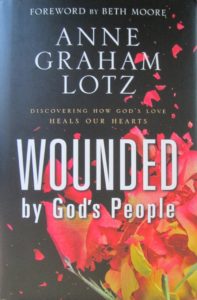CW and I were on an anniversary get-away, visiting shops in the small friendly towns of southwestern Kentucky. In a little antique store, my eyes locked onto the cover of one book among many on a low shelf: Wounded by God’s People, by Anne Graham Lotz.
Our church had been going through a rough time for quite a while, divided on selecting a new pastor. Two days before we left for our vacation, the vote had gone against the candidate presented to us. We were left without a pastor—and without half of the body who chose to leave. I have no doubt that there wasn’t a person on either side who escaped without a wound of some kind. When I saw that book, I knew I needed to read it.

Anne Graham Lotz is the president and CEO of AnGel Ministries, a speaker, and the author of numerous books. Her father, Billy Graham, called her the best preacher in her family. This book grew out of her many personal experiences of being wounded by the people she most loved and trusted, God’s people, when their behavior did not reflect what Jesus teaches.
If you have been around God’s people for any length of time, I’m sure you have a collection of your own wounds. That’s because, by human nature, people hurt other people. And the wounds are deepest when inflicted by the people we trust most, whom we feel safe with, whom we least expect to hurt us.
David expressed this pain well in Psalm 55:12-14 when a trusted friend betrayed him:
12 If an enemy were insulting me,
I could endure it;
if a foe were raising himself against me,
I could hide from him.
13But it is you, a man like myself,
my companion, my close friend,
14with whom I once enjoyed sweet fellowship
as we walked with the throng at the house of God.
The author uses the story of Hagar to illustrate every point she discusses. You can read Hagar’s story in Genesis 12, 13, 16, and 21, but here is a condensed version. Hagar was an Egyptian slave whom Pharaoh gave to Abraham. She became Sarah’s maidservant. Sarah was impatient waiting for God to give Abraham the child He promised, so she gave Hagar to Abraham to be his wife and bear him a child. After Hagar conceived, she despised Sarah. Sarah then lashed out at Abraham and also mistreated Hagar. Hagar ran away. God found her and sent her back. Hagar bore Abraham his son Ishmael. Fourteen years later, Sarah bore Abraham the promised son, Isaac. Ishmael mocked the young child Isaac. Sarah told Abraham to get rid of Hagar and Ishmael, so he sent them away. They wandered in the desert, where God found Hagar again.
We can see how this story illustrates one of Lotz’s key concepts: the wounded often become wounders themselves, creating a cycle of pain. Hagar was hurt when Sarah put her in an uncomfortable situation, hurt by someone she had lived with for ten years and had probably grown to trust. She then wounded Sarah. In Sarah’s pain, she wounded Abraham and Hagar. And years later, the cycle continued after Isaac was born.
In Wounded by God’s People, Lotz clearly explains what we can do to break the cycle of woundedness and move forward on our healing journey. These are a few of the points she expounds.
- The wounded person may want to run from the pain and, therefore, from God’s people, like Hagar did. But she cautions us not to run from God. We can never outrun Him anyway. He will follow us as far as we flee—because He loves us.
- Talking to others about our situation keeps wounds open. It is also a way of getting revenge. By revealing our misery, we hope to show how bad of a person our wounder is. Rather than retaliate, Lotz urges us to talk to God. Prayer changes our focus from our wounders to God, from our hurts to our Healer.
- When we focus on our wounders, we can’t see our own failures. We need to ask God to show us our blind spots and then follow with repentance.
- To reach a turning point, we must decide we want healing more than we want to live with our woundedness.

We will never achieve healing by blaming, silent treatment, or any other form of revenge. Forgiveness is the key. I have often wondered if I’ve truly forgiven someone. The author helped answer this question. She says the evidence of forgiveness is in loving our wounders as God loves them, and that means putting their well-being before our own. After the author decides to forgive someone, she intentionally does something for the person who hurt her. It could be as simple as sending a birthday card or buying them a cup of coffee. But it must be sacrificial, because love is sacrificial. God demonstrated His forgiveness to us by the greatest sacrificial act of all.

Lotz makes the important distinction between forgiveness and reconciliation. Forgiveness is giving up the right to hurt someone back, but reconciliation requires the sincere involvement of both people. So, though we can always make the choice to forgive, we can’t reconcile by ourselves. And when reconciliation does not occur, we can still talk to Jesus, receive His healing of our painful memories, and move forward in wholeness.
The abundance of personal anecdotes to illustrate both the effects of being wounded by God’s people and the path to healing made every chapter of this book flow and every concept easy to grasp. Getting an in-depth look into Hagar’s life was a treat for me. It was as if the author put her under a high-powered microscope and discovered everything Hagar might have experienced internally.
Every word of Wounded by God’s People is presented with grace by a woman who has lived through many wounded experiences and has learned how to allow God to heal her own heart and, in many cases, reconcile her broken relationships. To help each reader along his own path of healing, she asks probing questions throughout the pages to help us examine where we are in our own woundedness and guide us in how to proceed. Her deep desire is for the wounded to be healed by God, for the cycle of wounding to be broken, and for all to be reconciled to their loving God.
This book will not help you if you want to know how to get even with the people who hurt you, or how to make your wounders admit their wrongdoing, or how to keep from ever getting wounded again. However, it is a valuable resource to help you see your wounded experiences as God does and to provide scriptural and experiential guidance to break the cycle of wounding in your own life and find healing in your relationship with your Healer.
I highly recommend this book for all God’s people.




Sharon Bayes
November 12, 2020Thank you for this message. It’s one I hardly ever hear. And it is so very important. I don’t know how many times when talking to people about God and going to church that they told me of hurts they have gotten. Some reasons are that the church is full of hypocrites or Christians are so judgemental. The poor side of human nature can undo Christians if we don’t let God have run our life.
bspencer
November 12, 2020Yes, Sharon. Very well said. As Christians, we are to reflect Christ, not showcase human nature. I have to constantly examine myself to see where I am on the continuum. Talking to Jesus about my relationships can always move me in the right direction.
marilyn
November 12, 2020Truthfully, there is little time left to nurse grudges and unforgiveness of any kind. Jesus is coming soon. We can lay our woundedness at the feet of Jesus and He will heal. I am speaking from experience. Sometimes we are not aware that there is still a wound because we are no longer in the circumstance that brought it on, but He is faithful to reveal it and He is able to pull out the thorny bush of bitterness. Only He can do that. We can’t do it in our own strength or by our own efforts. I know that from experience, too. I give Him all praise for doing that very thing for me!
bspencer
November 12, 2020It is so true that we can’t heal ourselves. Thank you for your insight that we may think a wound is healed when it isn’t. If it isn’t, it will open up again in a similar situation. Praise God that He will show us the truth if we will be perceptive. His desire is for us to be whole. Thanks, Marilyn.
Angie Camp
November 12, 2020We are reading & pondering “Unafraid” by Susie Davis in my group of Christian ladies. Spirit-led introspection. Soul-burns. Forgiveness. Wholeness. “Taking captive every thought.” Our book and “Wounded by God’s People” each are tackling the nitty gritty stuff of life! Bonnie, thanks for letting us know about Ann’s book, Angie Camp
bspencer
November 12, 2020You’re welcome, Angie. Unafraid sounds great, too. I’ll have to look into that one.
Brenda Murphy
November 13, 2020I daresay it would be hard to make it through life without being wounded by Christians, and yes, we do our own share of wounding others. I try to gently remind the wounded that it’s not fair to judge God by his people. It sounds like a great book, thanks for the heads up! And for the lessons and reminder to live more Christ-like and to forgive quicker.
bspencer
November 13, 2020What you tell wounded people is so right, Brenda. God is so far above us. We should be able to see God’s character in our Christian brothers and sisters, and we often do. But when we are wounded, we need to look closely in the Word to stay focused on the perfect and constant love God has for us.